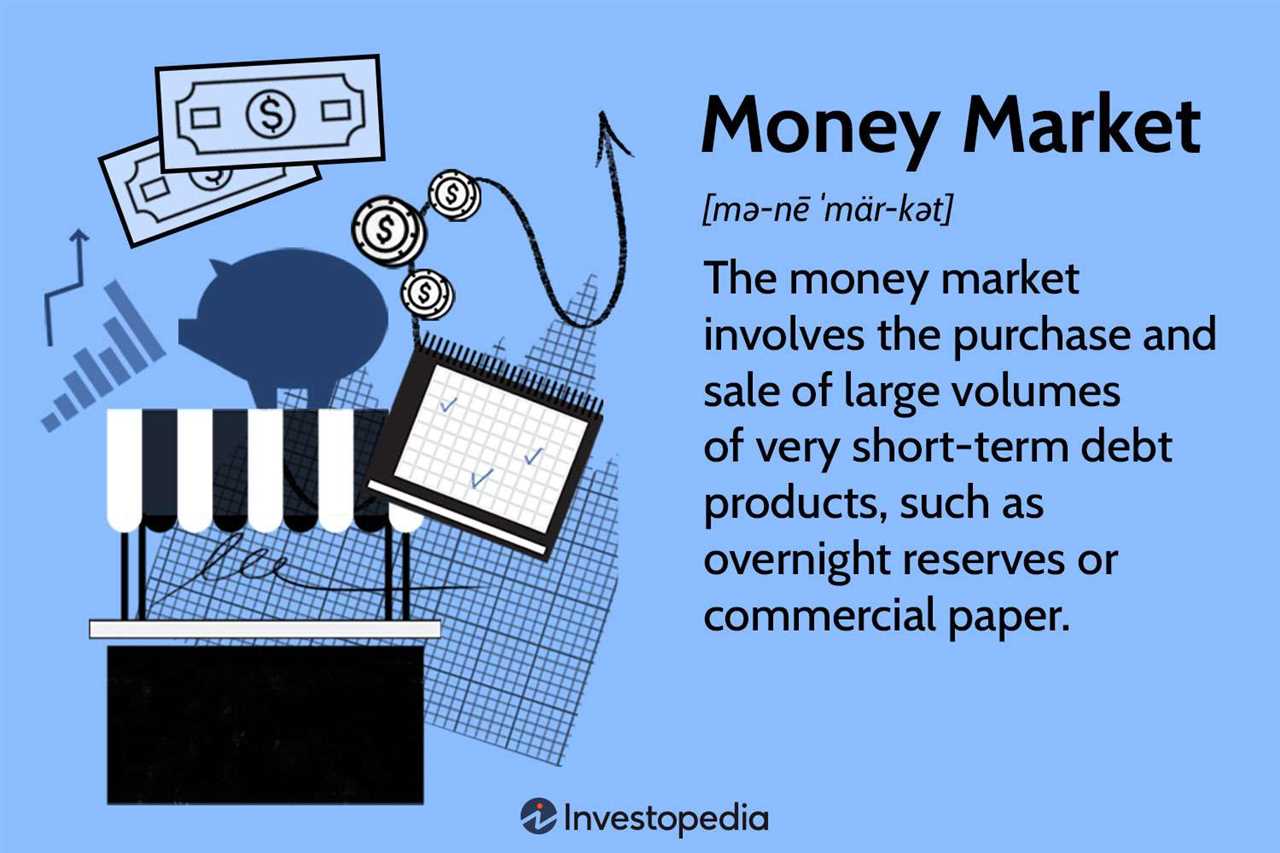Money Market Funds: A Comprehensive Guide
Money market funds are a type of mutual fund that invests in short-term, low-risk securities such as Treasury bills, certificates of deposit, and commercial paper. They are designed to provide investors with a safe and liquid investment option that offers a higher yield than traditional savings accounts.
Money market funds operate by pooling the investments of multiple investors to create a diversified portfolio of short-term securities. These funds aim to maintain a stable net asset value (NAV) of $1 per share, making them an attractive option for preserving capital and earning a modest return.
Investors can purchase shares of money market funds through brokerage firms, mutual fund companies, or directly from the fund itself. The funds typically have a low minimum investment requirement, making them accessible to a wide range of investors.
Money market funds offer daily liquidity, meaning investors can buy or sell shares on any business day. When an investor sells their shares, the fund will redeem them at the current NAV, allowing for easy access to cash when needed.
Evaluating the Advantages of Money Market Funds
There are several advantages to investing in money market funds:
| 1. Safety: | Money market funds invest in low-risk securities, making them a relatively safe investment option. The funds aim to preserve capital and provide stability, making them suitable for conservative investors. |
| 2. Liquidity: | Money market funds offer daily liquidity, allowing investors to easily access their funds when needed. This makes them a convenient option for short-term cash management. |
| 3. Diversification: | By pooling investments from multiple investors, money market funds create a diversified portfolio of short-term securities. This helps to spread risk and reduce the impact of any individual security’s performance. |
| 4. Higher Yield: | Money market funds typically offer higher yields than traditional savings accounts or money market deposit accounts. While the returns may not be as high as those from riskier investments, they provide a competitive return with minimal risk. |
Examining the Disadvantages of Money Market Funds
Despite their advantages, money market funds also have some disadvantages to consider:
| 1. Low Returns: | While money market funds offer higher yields than traditional savings accounts, the returns are generally lower than those from riskier investments such as stocks or bonds. This makes them less suitable for investors seeking higher returns. |
| 2. Interest Rate Risk: | Money market funds are subject to interest rate risk, meaning that changes in interest rates can affect the fund’s performance. When interest rates rise, the yields on new investments may increase, but the value of existing securities may decrease. |
| 3. Inflation Risk: | Money market funds may not keep pace with inflation, meaning that the purchasing power of the investment may decrease over time. This is a concern for investors looking to preserve and grow their wealth over the long term. |
| 4. Fees: |
Money market funds are a type of mutual fund that invests in short-term, low-risk securities, such as Treasury bills, commercial paper, and certificates of deposit. These funds aim to provide investors with a safe and liquid investment option that can generate a modest return.
Investment Strategy
These funds focus on capital preservation rather than capital appreciation. The primary goal is to maintain a stable net asset value (NAV) of $1 per share. This means that investors can buy and sell shares at the same price, ensuring liquidity and easy access to their funds.
Types of Money Market Funds
There are different types of money market funds available to investors, including government funds, prime funds, and municipal funds.
Government money market funds invest in short-term debt securities issued by the U.S. government, such as Treasury bills and government agency securities. These funds are considered to have the lowest credit risk and are suitable for conservative investors seeking maximum safety and liquidity.
Prime money market funds invest in short-term debt securities issued by corporations and financial institutions. These funds offer slightly higher yields compared to government funds but come with a slightly higher level of risk.
Municipal money market funds invest in short-term debt securities issued by state and local governments. These funds provide tax-exempt income for investors in higher tax brackets and are subject to credit risk associated with the issuing municipalities.
Benefits of Money Market Funds
Money market funds offer several benefits to investors:
- Liquidity: Money market funds provide easy access to cash as investors can buy and sell shares on any business day at the NAV price.
- Stability: These funds aim to maintain a stable NAV of $1 per share, providing stability to investors.
- Low Risk: Money market funds invest in low-risk securities, making them a suitable option for conservative investors.
- Diversification: By investing in a variety of short-term securities, money market funds offer diversification benefits.
Drawbacks of Money Market Funds
While money market funds have their advantages, there are also some drawbacks to consider:
- Low Returns: Money market funds typically offer lower returns compared to other types of investments, such as stocks or bonds.
- Inflation Risk: The returns from money market funds may not keep pace with inflation, potentially eroding the purchasing power of the investment.
- Interest Rate Risk: Money market funds are sensitive to changes in interest rates. A rise in interest rates can lead to a decline in the NAV of the fund.
Evaluating the Advantages of Money Market Funds
1. Liquidity
One of the main advantages of money market funds is their high level of liquidity. Investors can typically redeem their shares at any time, allowing them to access their cash quickly and easily. This makes money market funds a convenient option for individuals who may need to access their funds in the short term.
2. Stability
3. Diversification

Money market funds offer investors the opportunity to diversify their cash holdings. These funds typically invest in a wide range of securities issued by different issuers, which helps to spread the risk. By investing in a money market fund, investors can benefit from the diversification without having to individually purchase and manage multiple securities.
4. Competitive Returns
While money market funds are considered low-risk investments, they still offer competitive returns compared to traditional savings accounts or certificates of deposit (CDs). The yields on money market funds are influenced by short-term interest rates, and investors can earn a higher return compared to keeping their cash in a regular savings account.
5. Professional Management

Money market funds are managed by professional investment managers who have expertise in selecting and managing short-term securities. These managers actively monitor the market and make investment decisions on behalf of the fund’s shareholders. This allows investors to benefit from the knowledge and experience of the fund manager.
Examining the Disadvantages of Money Market Funds

1. Low Returns
2. Inflation Risk
Another disadvantage of money market funds is the risk of inflation eroding the purchasing power of the invested capital. Inflation can reduce the real value of the returns earned from money market funds over time. Investors should consider the potential impact of inflation on their investment goals and adjust their portfolio accordingly.
3. Limited Growth Potential
Money market funds are designed to provide stability and liquidity, making them suitable for short-term cash management. However, they may not offer significant growth potential compared to other investment options. Investors with long-term investment goals may need to consider diversifying their portfolio with higher-growth assets.
4. Credit Risk
Although money market funds are considered low-risk investments, they are not entirely risk-free. There is always a possibility of credit risk, which refers to the risk of default by the issuer of the underlying securities held by the fund. Investors should carefully evaluate the credit quality of the securities held by the fund to assess the potential credit risk.
5. Fees and Expenses
Money market funds may also come with various fees and expenses, including management fees, administrative fees, and other operating expenses. These fees can reduce the overall returns of the fund and should be taken into consideration when evaluating the potential benefits of investing in money market funds.

Emily Bibb simplifies finance through bestselling books and articles, bridging complex concepts for everyday understanding. Engaging audiences via social media, she shares insights for financial success. Active in seminars and philanthropy, Bibb aims to create a more financially informed society, driven by her passion for empowering others.
